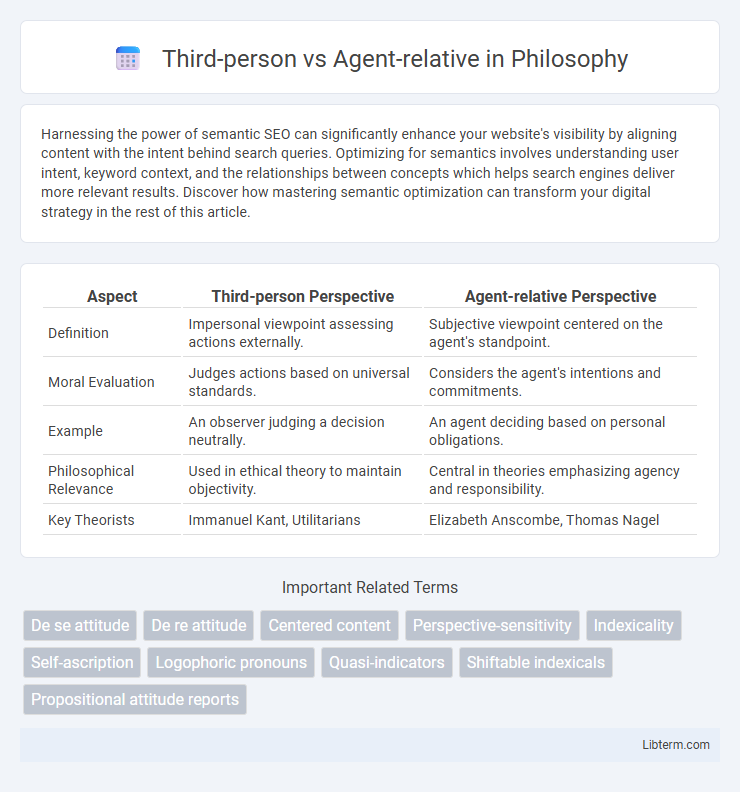Harnessing the power of semantic SEO can significantly enhance your website's visibility by aligning content with the intent behind search queries. Optimizing for semantics involves understanding user intent, keyword context, and the relationships between concepts which helps search engines deliver more relevant results. Discover how mastering semantic optimization can transform your digital strategy in the rest of this article.
Table of Comparison
| Aspect | Third-person Perspective | Agent-relative Perspective |
|---|---|---|
| Definition | Impersonal viewpoint assessing actions externally. | Subjective viewpoint centered on the agent's standpoint. |
| Moral Evaluation | Judges actions based on universal standards. | Considers the agent's intentions and commitments. |
| Example | An observer judging a decision neutrally. | An agent deciding based on personal obligations. |
| Philosophical Relevance | Used in ethical theory to maintain objectivity. | Central in theories emphasizing agency and responsibility. |
| Key Theorists | Immanuel Kant, Utilitarians | Elizabeth Anscombe, Thomas Nagel |
Introduction to Third-person and Agent-relative Perspectives
Third-person perspective describes events objectively from an outside viewpoint, focusing on observable actions and facts without emotional involvement. Agent-relative perspective centers on the agent's own point of view, emphasizing intentions, reasons, and personal motivations behind actions. Understanding these perspectives is crucial for analyzing ethical decisions, narrative structures, and cognitive processes in philosophy and psychology.
Defining Third-person Standpoint
The third-person standpoint involves an objective perspective where actions and events are described without reference to any specific individual's intentions or feelings. It presents information from an outside observer's view, emphasizing facts and behaviors rather than personal agency. This contrasts with the agent-relative viewpoint, which centers on the intentions, responsibilities, or motivations of the individual acting within the scenario.
Understanding Agent-relative View
The agent-relative view centers on moral judgments and actions evaluated from the perspective of the individual agent involved, rather than from an objective third-person standpoint. This approach emphasizes the agent's intentions, commitments, and practical reasoning, highlighting how personal reasons and context influence ethical decisions. Understanding the agent-relative view is crucial for grasping how subjective perspectives shape moral responsibility and normative assessments within philosophical ethics.
Key Differences Between Third-person and Agent-relative Approaches
Third-person approaches analyze actions from an external, objective viewpoint, emphasizing observable behaviors and outcomes without considering the agent's subjective experience. Agent-relative approaches prioritize the agent's perspective, incorporating intentions, motivations, and personal reasons to interpret actions. Key differences include the focus on external objectivity versus internal subjectivity and the resultant impact on moral and philosophical evaluations of agency and responsibility.
Philosophical Foundations of Each Perspective
Third-person perspectives emphasize objective observation, relying on universal principles and detached analysis central to positivist and realist philosophies. Agent-relative perspectives prioritize subjective experience and moral responsibility, rooted in ethical theories like Kantian deontology and phenomenology that highlight individual agency. The philosophical foundation of third-person views aligns with metaphysical objectivity, whereas agent-relative views underscore practical reason and first-person moral reasoning.
Applications in Ethics and Decision-Making
Third-person ethics emphasizes impartiality by evaluating actions from a universal standpoint, common in legal systems and global human rights frameworks that require objective standards. Agent-relative ethics centers on the individual's perspective, prioritizing personal commitments and relationships, influencing fields like medical decision-making and personal moral dilemmas. Applications in decision-making highlight how third-person perspectives guide policy development, while agent-relative views inform personalized ethical choices in caregiving and professional responsibilities.
Strengths of Third-person Reasoning
Third-person reasoning excels in providing an objective and comprehensive overview of situations, enabling consistent decision-making independent of individual biases or perspectives. It facilitates a unified framework for analyzing complex scenarios by aggregating multiple viewpoints into a coherent whole. This broad, impartial stance enhances the accuracy and scalability of reasoning processes in fields like artificial intelligence and ethical decision-making.
Advantages of Agent-relative Perspective
The agent-relative perspective prioritizes the intentions, beliefs, and motivations of the individual acting, enabling more accurate predictions of behavior in social interactions. This viewpoint facilitates better understanding of moral responsibility by closely linking actions to the actor's decision-making context. It also enhances empathy and communication by centering analysis on the agent's subjective experience rather than abstract third-person observations.
Potential Conflicts and Resolutions
Potential conflicts between third-person and agent-relative perspectives arise when moral judgments differ due to varying standpoints on responsibility and outcomes. Third-person perspectives emphasize objective, impartial evaluations, while agent-relative viewpoints prioritize personal commitments and contextual duties, leading to clashes in ethical decision-making. Resolving these conflicts often involves integrating empathetic reasoning with universal principles to balance individual intentions and broader moral consequences.
Conclusion: Choosing the Appropriate Perspective
Selecting the appropriate perspective between third-person and agent-relative viewpoints hinges on the context and the intended clarity of communication. Third-person perspective offers objectivity and a comprehensive overview, making it suitable for analytical or formal narratives. Agent-relative perspective enhances personalization and moral evaluation by focusing on the agent's viewpoint, ideal for ethical discussions and subjective assessments.
Third-person Infographic

 libterm.com
libterm.com